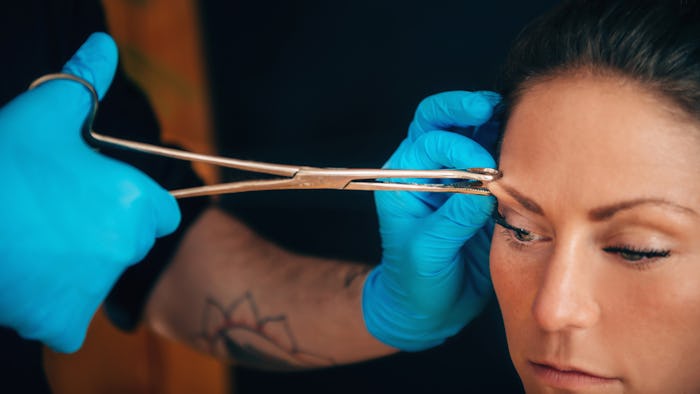Life
7 Gross Things That Happen To Your Body When You Get A Piercing
Though not everyone, of course, has a piercing, body piercings are far from uncommon. In fact, you probably know a lot of people who have them, whether you actually realize they have a piercing or not. And while, generally, if you do your research and think things through, piercings really shouldn't be super dangerous, there are still some gross things that happen to your body when you get a piercing, or things that can happen to you, that you might want to make sure you consider and keep in mind when deciding whether or not to get a piercing, as well as where to potentially get one.
One of the more obvious decisions that you have to make when you're thinking about getting a piercing is, of course, where you want that piercing to be. While you might think that a lot of places have the same pros and cons associated with them, there really can be different factors for each. Perhaps the biggest decision that comes with deciding to get a piercing is where you're going to go to get that piercing and who you're going to have do the piercing. Doing research, meeting or speaking with your piercer ahead of time (if possible), and asking questions can help you determine if it's the right place for you. You can't definitively prevent every potential gross thing associated with piercings from happening, but they're worth knowing about all the same.
1The Jewelry Could Disappear
It sounds implausible, but it's actually not. Dr. Jason Wilson, MD, the director of clinical research in the department of internal medicine at USF Health told Women's Health that regardless of the type of piercing you have, but especially if you have a dermal piercing, you shouldn't just dismiss it if it's disappeared because it could mean that the jewelry is stuck in your body's soft tissues, which could potentially require an emergency room visit.
Don't brush it off. Sure, an earring might fall out, but if you can't find all the parts, check the site of the piercing for potential issues and irritation.
2You Might Have An Allergic Reaction
Allergies to metals like nickel can be pretty common, and you might not know you have one if you haven't been tested for allergies before. A dermatologist told me I was allergic to nickel after I tried to wear earrings made from nickel and experienced a seriously uncomfortable reaction. If you have an allergic reaction, it might not look like you'd expect it to, but that doesn't mean that something isn't wrong. This doesn't mean that you have to let your piercings close up, necessarily, either, but rather that you have to be sure of the materials that your jewelry is made from before wearing.
3It Could Get Crusty
Typically, anything crusty is pretty gross, and a crusty piercing is no different. In an interview with Northwestern University's Helix Magazine, Dr. Jaimee Holbrook, MD, then a clinical research fellow, said that crust near a piercing can indicate an infection. The infection might not be super serious, but it still needs to be treated appropriately.
4You Could End Up With Some Gross Discharge
If you notice pus or other gross discharge, that could be another sign of an infection, as Mayo Clinic noted. Make sure you're taking care of your piercing, aren't allergic to the metal in the jewelry, and address the infection right away.
5With Oral Piercings, There Could Be Some Serious Dental Issues
It's probably not a complete surprise to hear that piercings in your mouth could potentially negatively affect your dental health. In an interview with Refinery29, dentist Dr. Michael Apa, DDS, said that with a so-called "Smiley" gum piercing, you should be aware that the piercing can cause tooth issues like chipped teeth, receding gums, and potentially an infection. It's definitely something to think about before getting an oral piercing.
6They Could Tear Your Skin
Torn earlobes and other skin injuries are very real possibilities when you get piercings. That, in and of itself, might not dictate whether or not you get one, but you should be aware of the risk regardless. The aforementioned article from Mayo Clinic noted that, in some cases, these accidents can make stitches or other procedures necessary in order to fix them.
7The Body Can Reject The Piercing
In some cases, your body might reject the piercing, which is a sort of weird phenomenon, if not entirely disgusting. In an interview with HuffPost, Dr. Amy J. Derick, MD, a board-certified dermatologist and a clinical instructor of dermatology at Northwestern University, said that if your body seems to be pushing the piercing out or otherwise rejecting it, it's because it registered the jewelry as a "foreign body." The body tries to expel foreign bodies in order to keep you safe and healthy.
Check out Romper's new video series, Bearing The Motherload, where disagreeing parents from different sides of an issue sit down with a mediator and talk about how to support (and not judge) each other’s parenting perspectives. New episodes air Mondays on Facebook.
